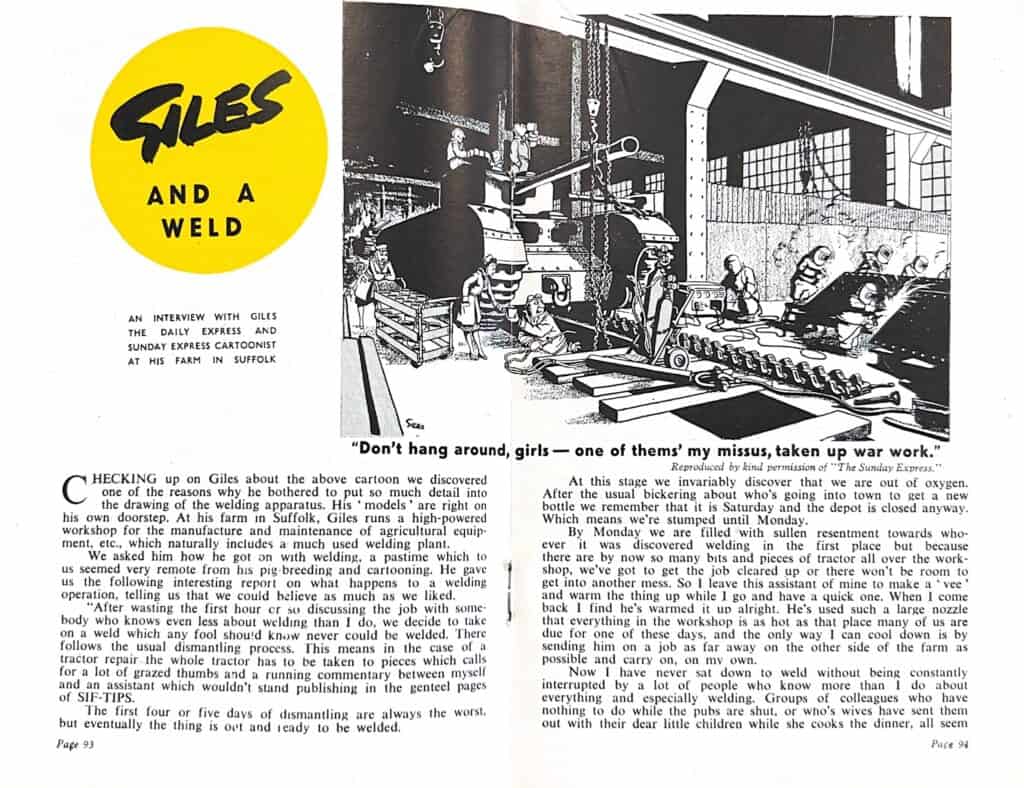Introduction
The Second World War brought about a unique intersection of various professions and skills, as individuals from all walks of life contributed to the war effort in any way they could. Among these contributors was Giles, a well-known cartoonist for the Daily Express and Sunday Express, who found himself deeply involved in welding and machinery repair at his farm in Suffolk. This case study explores how the Suffolk Iron Foundry (SIF), founded in 1925, played a crucial role in supporting individuals like Giles by providing essential welding technology and expertise during the war.
Giles and His Unexpected Welding Journey
Giles, known for his sharp wit and humorous cartoons, also managed a farm in Suffolk. With the war intensifying, the need for maintaining and repairing agricultural equipment became more critical. Giles set up a high-powered workshop on his farm, which included a much-used welding plant. Despite his primary career as a cartoonist and pig breeder, Giles dove into the world of welding, driven by necessity and a touch of curiosity.
In an interview published in “SIF-TIPS,” Giles humorously detailed his welding endeavors. He described the typical chaos of his workshop, where tasks often started with theoretical discussions about welding that any fool should have known were impractical. The dismantling process was particularly arduous, involving grazed thumbs and a stream of colorful commentary, which he joked wouldn’t be suitable for the genteel pages of “SIF-TIPS.”

The Role of SIF in Supporting Wartime Welding
- Providing Essential Equipment
The Suffolk Iron Foundry was instrumental in supplying the necessary welding equipment that enabled individuals like Giles to carry out essential repairs. By producing and distributing high-quality welding apparatus, SIF ensured that even those with limited welding experience could maintain and repair machinery vital for the war effort. This support was crucial as it allowed agricultural and industrial operations to continue without significant downtime.
- Technical Expertise and Training
SIF didn’t just provide equipment; it also offered invaluable technical expertise. The foundry’s engineers and technicians were on hand to provide guidance and advice, helping users like Giles navigate the complexities of welding. This support was often conveyed through detailed manuals, instructional pamphlets, and, in some cases, on-site visits. The editorial’s depiction of engineers and draughtsmen working tirelessly reflects SIF’s commitment to ensuring that every customer, regardless of their welding proficiency, could achieve successful outcomes.
- Innovation in Welding Technology
During the war, SIF was at the forefront of welding innovation. They developed new techniques and technologies that made welding more efficient and accessible. For Giles, this meant that even complicated repairs, which initially seemed impossible, became manageable. SIF’s advancements in welding technology were crucial in transforming welding from a specialized skill into a widely applicable tool across various fields.
- Community and Moral Support
Beyond technical and material support, SIF fostered a sense of community among its users. The regular publications of “SIF-TIPS” served not only as a technical resource but also as a platform for sharing stories and experiences. Reading about others’ welding mishaps and triumphs, such as Giles’s humorous accounts, helped build a network of mutual support and camaraderie among welders and repairmen.
Impact and Legacy
The support provided by SIF during the war had a lasting impact. By equipping individuals like Giles with the tools and knowledge they needed, SIF ensured that critical machinery and equipment remained operational, contributing to the broader war effort. The foundry’s dedication to innovation and education also paved the way for post-war advancements in welding technology and practices.
Giles’s story, as recounted in “SIF-TIPS,” exemplifies the everyday heroism and ingenuity that characterized the wartime period. His ability to maintain and repair equipment on his farm, with the help of SIF’s resources, highlights the vital role that industrial support played in sustaining both agricultural and military operations.
Conclusion
The case of Suffolk Iron Foundry during World War II showcases how strategic support and innovation in welding technology could make a significant difference, even in the most unexpected places. By empowering individuals like Giles, SIF not only contributed to the immediate war effort but also laid the groundwork for future industrial advancements. This historical narrative underscores the enduring importance of adaptability, community, and technical excellence in overcoming challenges and achieving success.
